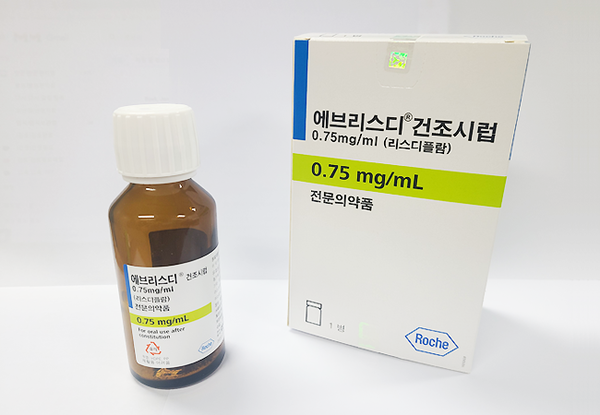Roche Korea said on Wednesday that its oral treatment for spinal muscular atrophy (SMA), Evrysdi (ingredient: risdiplam), obtained health insurance coverage from Oct.1.

Accordingly, Evrysdi will be covered for patients with 5q SMA with a confirmed genetic diagnosis of a deletion or mutation in the 5q SMN-1 gene who either have three or fewer copies of the SMN2 gene before the onset of symptoms and are less than 6 months old at the time of treatment initiation. Additionally, the coverage will also benefit those who are type 1 to type 3 with SMA-related clinical symptoms and signs and are not on a permanent ventilator.
SMA is a rare, inherited neuromuscular disease that causes progressive muscle weakness throughout the body due to a deficiency of the survival motor neuron (SMN) protein essential for motor function. Symptoms usually first appear in infancy, but can also appear in adulthood, and are characterized by progressive degeneration of various muscles, including motor functions.
Evrysdi is the first and only oral treatment for 5q SMA with a recommended, age- and weight-specific, once-daily dose. Evrysdi binds to the pre-mRNA of the SMN2 gene to increase and maintain the concentration of survival motor neuron (SMN) protein, which can cross the blood-brain barrier and is distributed evenly throughout the body, including the central nervous system, increasing SMN protein throughout the body.
Evrysdi offers easy self-administration at home, and the oral formulation helps patients who may not be able to access traditional spinal injections due to scoliosis. In fact, the vast majority of people with amyotrophic lateral sclerosis (ALS) develop scoliosis as the disease progresses due to deterioration of the muscles that support the spine, with scoliosis typically reported to occur in 60-90 percent of patients with types 1 and 2 and in approximately 50 percent of patients with types 2 and 3 who are unable to walk.
This coverage is based on multiple large global clinical trials for Evrysdi including FIREFISH, SUNFISH, JEWELFISH and RAINBOWFISH. These studies confirmed the efficacy and safety profile of Evrysdi in improving motor function in patients with Duchenne muscular dystrophy across a broad age range, from infants and children 16 days of age and older to adolescents and adults, and also confirmed the safety and tolerability profile in patients previously treated with other disease-modifying agents.
In all four clinical studies, there were no adverse events associated with Evrysdi treatment that led to treatment discontinuation, and the overall safety profile was favorable. In particular, overall adverse events continued to decrease over time (36 months), confirming the therapeutic benefit in patients with SMA type 1 and type 2 or 3.
"Depending on the type of disease, there is a group of patients with normal life expectancy, and continuous and systematic management throughout the lifespan is very important," said Professor Chae Jong-hee, Director of the Rare Disease Center at Seoul National University Hospital. "It is encouraging to see that these patients have a new oral option to treat and manage their disease more easily over the long term, and we look forward to the future of personalized treatment in the field of SMA based on patient type, condition, and preferences."

